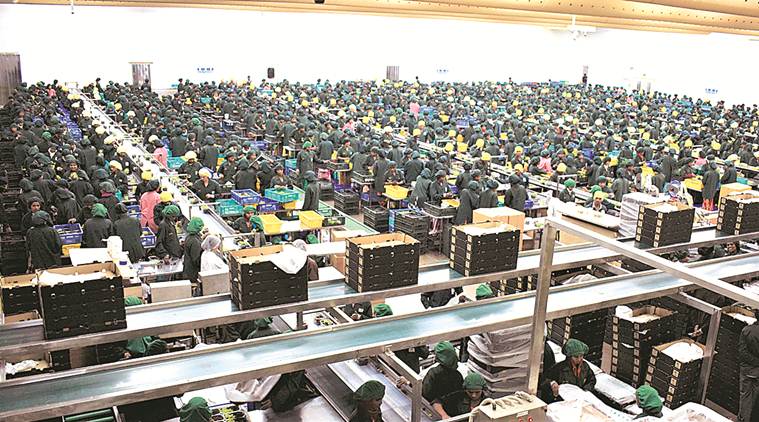- India
- International
How a farmers’ producer company is India’s largest grape exporter
In 2018-19, Sahyadri FPC exported 21,141 tonnes of grapes to the EU, Russia and UAE, while recording a profit of Rs 17.89 crore on total sales of Rs 360 crore.
 The export pack house of Sahyadri Farms. (Express photo)
The export pack house of Sahyadri Farms. (Express photo)
Back in 2011, when Vilas Shinde decided to convert his “farmer-entrepreneurs” company into a full-fledged cooperative or Farmers Producer Company (FPC), there were economic and market-driven compulsions behind it.
Shinde’s journey as an agro entrepreneur had begun in 2004, when he, along with nine other farmers in Nashik’s grape bowl, incorporated a privately-held company to undertake direct exports and help realise a better value for their produce. That very year, the fledgling firm shipped 4 containers of fresh grapes to the European Union (EU).
2009, however, proved a watershed moment, when the EU rejected grape consignments from India after they were detected to have pesticide residues beyond acceptable limits. That, according to Shinde, was the trigger for forming the Sahyadri FPC, which, by 2013, had 550 farmer-shareholders.
“My idea was always to build a value chain specifically for small and marginal farmers. But now, we also realised the need for investing both in infrastructure and backend integration to enable farmers grow quality produce,” he says.
In 2018-19, Sahyadri FPC exported 21,141 tonnes of grapes to the EU, Russia and UAE, while recording a profit of Rs 17.89 crore on total sales of Rs 360 crore. The latter also included domestic sales through 13 retail shops in Nashik and Mumbai. This company, which now has over 6,600 farmers, is also India’s largest grapes exporter.

Sahyadri has a three-tier structure comprising the apex organisation itself, crop-wise FPCs and farmers under them. The mandate of the crop-wise FPCs (for grapes as well as tomatoes, pomegranates, bananas, guavas and other fruits & vegetables) is to provide technical support to farmers, apart from undertaking aggregation, grading, sorting and packaging of produce. The apex Sahyadri FPC handles post-harvest management, processing, distribution and marketing, both for exports and the domestic market.
Sahyadri’s 65-acre campus at Mohadi village in Nashik’s Dindori taluka today has infrastructure for packing, pre-cooling, ripening, cold storage and aseptic processing of the produce of its farmer-members. Equally significant is the backend integration system, wherein the plots of individual farmers are geo-tagged to allow the company keep real-time update of the crop’s growth and accordingly plan its harvest calendar. Besides remotely monitoring crop condition on the ground through an in-house IT platform, Sahyadri also claims to guarantee complete traceability of its farmers’ produce by embedding the related information in bar-coded packets.
Shinde admits that price volatility in the commodities handled by his organisation presents its own unique set of challenges. Sahyadri has recently signed a contract with Hindustan Unilever to manufacture jam, squash and tomato puree for the latter. This, it hopes, would help cushion growers from production glut-induced price crashes and also improve capacity utilisation in the already-created processing infrastructure at the Mohadi complex.
Shinde’s next target is to design an insurance product targeting grape farmers. “The present so-called weather-based products are not subscribed, as their coverage does not reflect ground reality. For example, in Nashik, unseasonal rains happen in September and October, whereas the insurance cover offered is applicable only after November 15,” he points out. The recent post-September heavy rains, the second time after 2017, has made the design of an effective insurance product all the more necessary.
Apr 18: Latest News
- 01
- 02
- 03
- 04
- 05






































